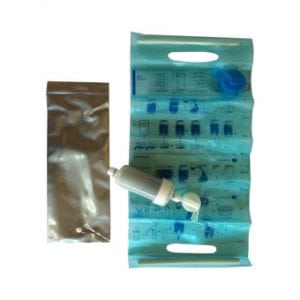
Agriculture
December 29, 2023
LifeWell Water Filter
Read SolutionImplemented by
RealRelief
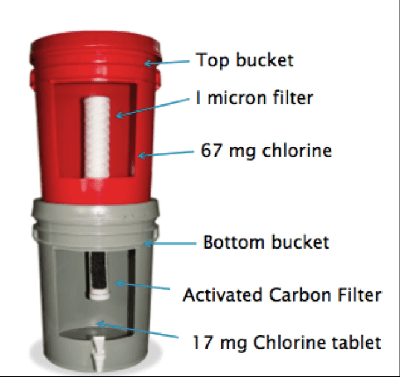
Updated on January 24, 2024
·Created on October 3, 2019
The Gift of Water is a 2-bucket system for chlorinating and filtering water for use in Haitiian homes.
The Gift of Water filter is a two-bucket set purification system designed and manufactured by Gift of Water, an Indiana based nonprofit organization dedicated to providing clean drinking water for communities in Haiti. This system incorporates both physical filtration for particle removal and chlorination for disinfection to provide purified water.
Target SDGs
SDG 6: Clean Water and Sanitation
SDG 3: Good Health and Well-Being
Market Suggested Retail Price
$30.00
Target Users (Target Impact Group)
Community
Distributors / Implementing Organizations
This product has been implemented by Gift of Water which works closely with CAWST (Centre for Affordable Water and Sanitation Technologies) to ensure that beneficiaries are educated in all areas of WASH to optimize the health benefits. The program is carried out through established organizations (e.g. medical facilities, churches, and grass-roots community organizations) in Haiti.
Competitive Landscape
Direct competitors include WATERisLIFE Nano Bucket Filter, Sawyer Point ZeroTwo Water Purifier, Grifaid Family Filter, VF 100 Village Bucket Filter, Aqusafe Filters, WateROAM ROAMfilter Lite, and Sawyer PointOne Filter.
Countries
Haiti
Manufacturing/Building Method
Gift of Water filters are manufactured by Gift of Water organization in Indiana, USA. Thousands of units are shipped to Haiti annually with the help of volunteers that build the different parts of the units through annual building sessions before distribution.
Intellectural Property Type
Select Type
User Provision Model
This product is distributed to communities across Haiti by Gift of Water in association with CAWST and established organizations in Haiti (e.g. medical facilities, Christian churches and grass-roots community organizations).
Distributions to Date Status
As of 2015, 15,000 purifiers had been delivered in Haiti. For more information on the communities in Haiti where these have been distributed see in research and standards.
Design Specifications
The Gift of Water system involves prechlorination, followed by a string filter, granular activated carbon, and then post-chlorination. In the first bucket, a 67 mg tablet of free chlorine disinfects the raw water from bacteria. Water then flows through the 1 micron (?m) polypropylene string filter which removes suspended solids and larger disease-causing protozoa in the first bucket. In the second bucket, granular activated carbon is used to remove organics, chlorine, harmful chemicals, heavy metals, bad taste and residual disinfectants, and then a 17 mg tablet of free chlorine for post-chlorination keeps the product water safe from recontamination. Users access the treated water via a tap in the bottom bucket.
These are the specific steps for users to follow:
Add 5 gallons of water (20 litres) to the top/red bucket
Add a 67mg (red) chlorine tablet to the water
Allow 30 minutes contact time.
Place the top bucket on the bottom bucket, which activates a check-valve so that water flows through the two filters and into the bottom bucket.
Add a 17mg (grey) chlorine tablet to bottom bucket
Allow water to run through from top bucket to bottom bucket
Technical Support
Users can access technical support for filters through local technicians that do monthly household visits in Haiti. Interview with representative
Replacement Components
Replacement components include: Aquatabs (chlorine tablets 67mg and 17mg), activated charcoal to recharge filter, string filter and occasionally if lost: spigot, coupler, stainless steel washer and check valve. Reduced flow from top bucket to bottom indicates string filter needs changing. A strong chlorine smell or taste in the bottom bucket indicates activated charcoal needs changing. Interview with representative
Lifecycle
This product is expected to last at least 3 years being used once per day (~5500 gallons) however the exact lifetime is not known; some systems have lasted over 25 years. No warranty is included but in the case of a defective part, the manufacturer changes out the part at no cost. Interview with representative
Manufacturer Specified Performance Parameters
The Gift of Water system was designed to improve the health of users, remove bacteria and carcinogens, reduce turbidity, improve taste and visual water appearance. Manufacturer specified performance targets include: rapid filtration, user acceptability, and ease-of-use.
Vetted Performance Status
Testing by Purdue University in 2013 determined: 100% inactivation of the Coli bacteria, Effluent turbidity of <5 NTU when the influent water turbidity was ? 12 NTU, A concentration of 27 ?g/L Chloroform (CHCl3) in effluent water samples as the only Volatile Disinfection By-Product found to be present. Average free and total chlorine concentrations in the final water samples of approximately 0.54 mg/L as Cl2and 0.58 mg/L as Cl2, respectively. An average decreased of 38% of UV-absorbing compounds from the raw to final water samples which implies these compounds are successfully removed by the system. An average of 4037 liters of water through the filter before clogging occurred which was determined when the filter reached a flow rate of 2 mL/s, corresponding to a filtration time of 2.8 hours. 99.99999% (7 log) removal for the ?S1 phage(which infects the bacteria Pseudomonas fluorescens) suspension and 99.99% (4 log) removal for the T4 phage(which infects the bacteria E.coli) suspension Under the time periods studied, the water used in experiments at Purdue University were worse than what the Gift of Water filter users would experience in Haiti in coliconcentrations(1.5 – 48.3 MPN per 100mL of sample) and turbidity(0.19 - 6.64 NTU).
Safety
Potential hazards might include ingestion of a chlorine tablet, which is why the manufacturer instructs that these be kept away from children. Interview with representative
Complementary Technical Systems
None. Interview with representative
Academic Research and References
Costello, A., 2013, Evaluation of Process Changes on Finished Water Quality for Gift of Water System, Master of Science in Civil Engineering dissertation, Purdue University, West Lafayette, Indiana.
Van Zyl, N., 2001, Sodium Hypochlorite Generation for Household Water Disinfection in Haiti, Master of Engineering in Civil and Environmental Engineering dissertation, Massachusetts Institute of Technology, Boston, MA.
Lantagne, D. S., 2001, Trihalomethane Formation in Rural Household Water Filtration Systems in Haiti, Master of Engineering in Civil and Environmental Engineering dissertation, Massachusetts Institute of Technology, Boston, MA.
“The Program,” Gift of Water, 06-Apr-2022. Available: https://giftofwater.org/the-program/
“CAWST – Calgary nonprofit making water knowledge common knowledge,” CAWST. Available: https://www.cawst.org
“Donate,” Gift of Water, 04-Nov-2021. Available: https://giftofwater.org/donate/
“Oxfam Gifts is closed,” Oxfamamerica.org. Available: https://www.oxfamamerica.org/donate/oxfam-gifts/
Goal 6. (n.d.). Sdgs.un.org. Available: https://sdgs.un.org/goals/goal6
“The Purifier,” Gift of Water, 06-Apr-2022. Available: https://giftofwater.org/the-purifier/
“Volunteer,” Gift of Water, 07-Apr-2022. Available: https://giftofwater.org/volunteer/
“Gift of Water System Research,” Gift of Water, 06-Apr-2022. Available: https://giftofwater.org/gift-of-water-system-research/
Compliance with regulations
The Gift of Water system meets WHO and EPA Maximum allowable level of E. coli bacteria in drinking water. It also meets the EPA requirement for virus removal and maximum turbidity limits for systems involving alternative filtration (EPA turbidity regulations).
Evaluation methods
The Gift of Water purification system was evaluated for flow rate, bacterial inactivation, turbidity, free, total and combined residual chlorine concentrations, volatile disinfection by-products (DBPs), and UV absorbance at 254 nm (as an indicative of the organic compounds present in the water that associated with potential DBP formation) clogging rate, human virus removal and source water quality in Haiti by Purdue University in 2013.
Other Information
None

Agriculture
December 29, 2023
Implemented by
RealRelief
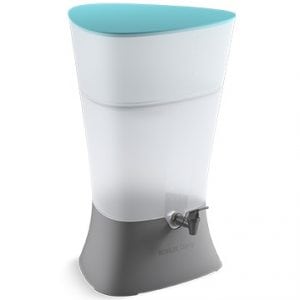
Agriculture
January 11, 2024
Implemented by
Kohler
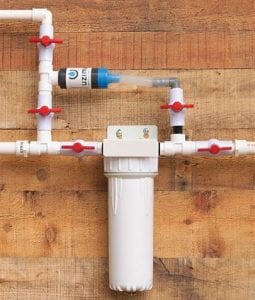
Agriculture
January 2, 2024
Implemented by
Uzima
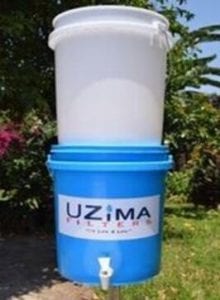
Agriculture
January 2, 2024
Implemented by
Uzima
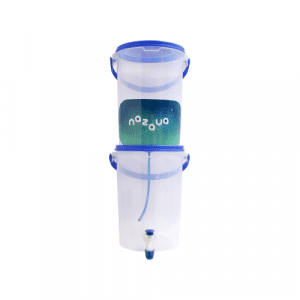
Agriculture
December 7, 2023
Implemented by
Nazava
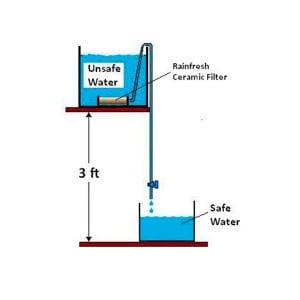
Agriculture
December 12, 2023
Implemented by
Envirogard Products Ltd
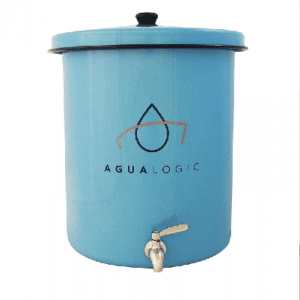
Agriculture
December 7, 2023
Implemented by
Agualogic
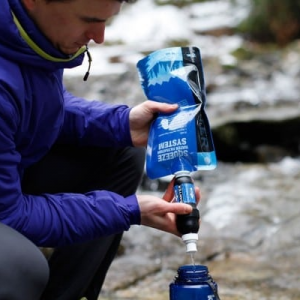
Agriculture
December 29, 2023
Implemented by
Sawyer
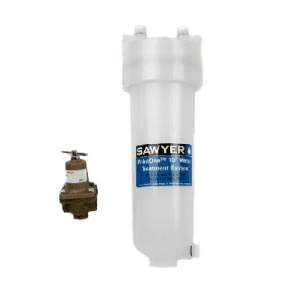
Agriculture
December 29, 2023
Implemented by
Sawyer
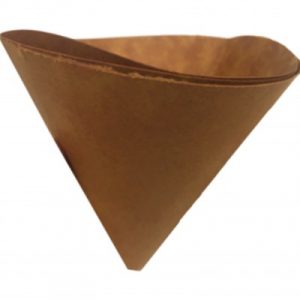
Agriculture
January 24, 2024
Implemented by
Folia Water
Have thoughts on how we can improve?
Give Us Feedback